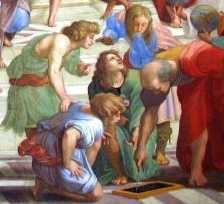Ecce iam noctis tenuatur umbra
Behold, now the shadows of the night are made thin
lucis aurora rutilans coruscat;
the reddened lights of dawn shimmer
nisibus totis rogitemus omnes
with all effort let us all implore
cunctipotentem,
the Omnipotent One
Lo! the dim shadows of the night are waning;
radiantly glowing, dawn of day returneth;
fervent in spirit, to the mighty Father
pray we devoutly.
Ut Deus, nostri miseratus, omnem
That God, our compassionate benefactor, all
pellat angorem, tribuat salutem,
anxiety may banish, may grant salvation
donet et nobis pietate patris
and give to us in his loving, Fatherly goodness
regna polorum.
heavenly kingdoms.
So shall our Maker, of His great compassion,
banish all sickness, kindly health bestowing;
and may He grant us, of a Father's goodness,
mansions in heaven.
Praestet hoc nobis Deitas beata
May the blessed Deity fulfill this for us
Patris ac Nati, pariterque Sancti
Father and Son, and equally the Holy
Spiritus, cuius resonat per omnem
Spirit, whose glory resounds throughtout
gloria mundum. Amen.
the whole world.
This He vouchsafe us, God for ever blessed,
Father eternal, Son, and Holy Spirit,
Whose is the glory which through all creation
ever resoundeth. Amen.
Pope St. Gregory the Great(540-604), Tr. by M.J. Blacker
After a week of all Ambrosian meter (8.8.8.8), it is a change to finally hit "Sapphic and Adonic" meter. Sapphic and Adonic translates in to 11.11.11.5 for a hymn tune. There are not many English hymns written in this meter (such as Father we thank thee who hast planted) but many old Greek and Latin poems use it, and so many medieval hymns like this one are written this way. Poets.org says this about Sapphic and Adonic:
The strict meter of the sapphic, with its starts and stops, creates a powerful
emotion that the language of the poem intensifies. Starting with a stressed
syllable, as opposed to the familiar iambic foot that begins on an unstressed
syllable, provides a sense of forcefulness and urgency to the sapphic, while the
extra unstressed syllable at the core of the first three lines, offers a pause,
or caesura, within the driving movement. The short fourth line may offer either
a rest or a quick turn to the poem, or even an opportunity for conclusion, as
with the final two lines of a Shakespearean sonnet.
That last short line is called an Adonic. The word "Sapphic" comes from the Greek poet Sappho, who either invented or refined this meter. She is a one of the few of ancient Greek female poets. She lived on the island of Lesbos. She was later parodied as being a promiscous lesbian, which historically is probably not accurate, but the modern word "lesbian" takes its meaning from the island where Sappho lived based on those ribald parodies. Seems like everyone remembers the pop culture references and not the real story.
Anyways, a lot of hymns for the Office of Readings are written in this meter. I am anxious to get to analyzing hymns for the Office of Readings, but first I have one more week of Lauds hymns, followed by two weeks of Vespers hymn analysis. Then I can start the OR hymns.

No comments:
Post a Comment